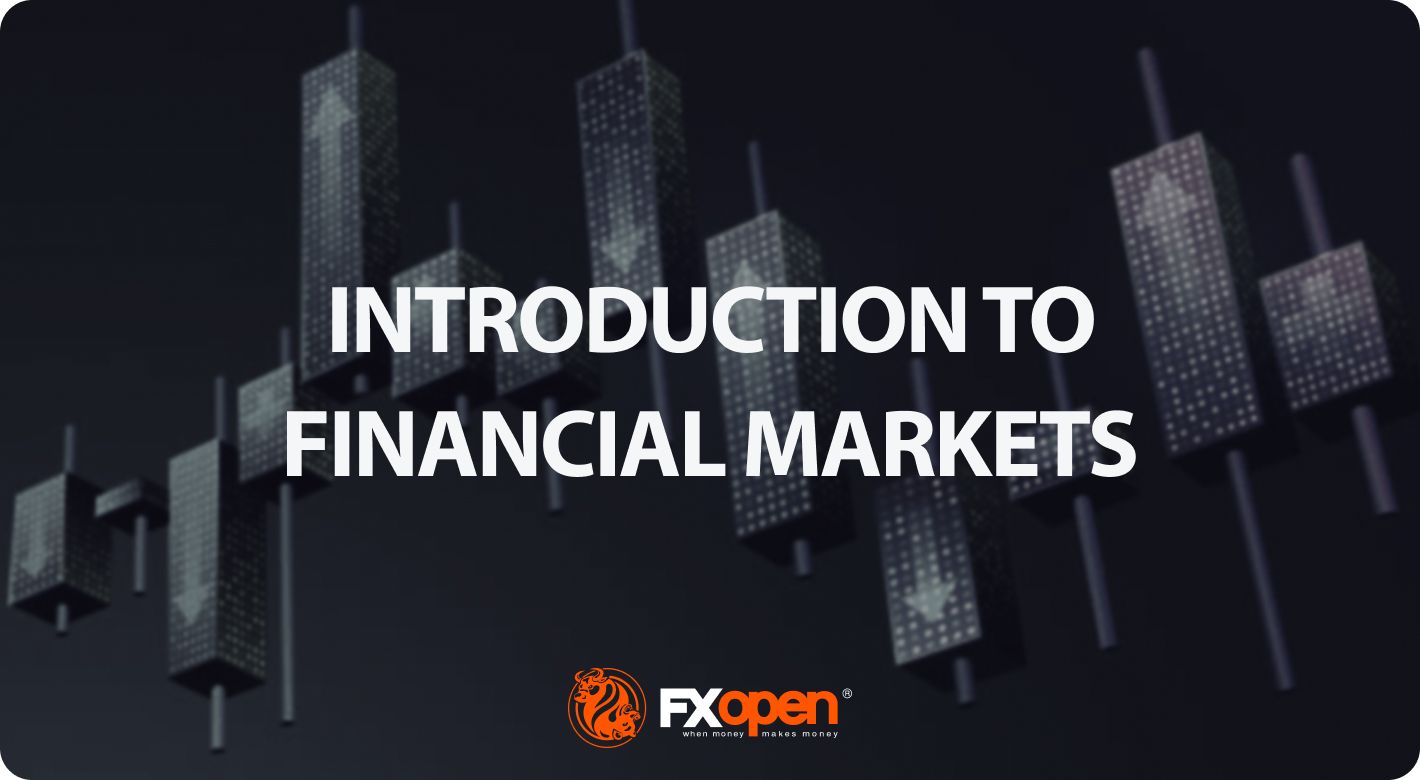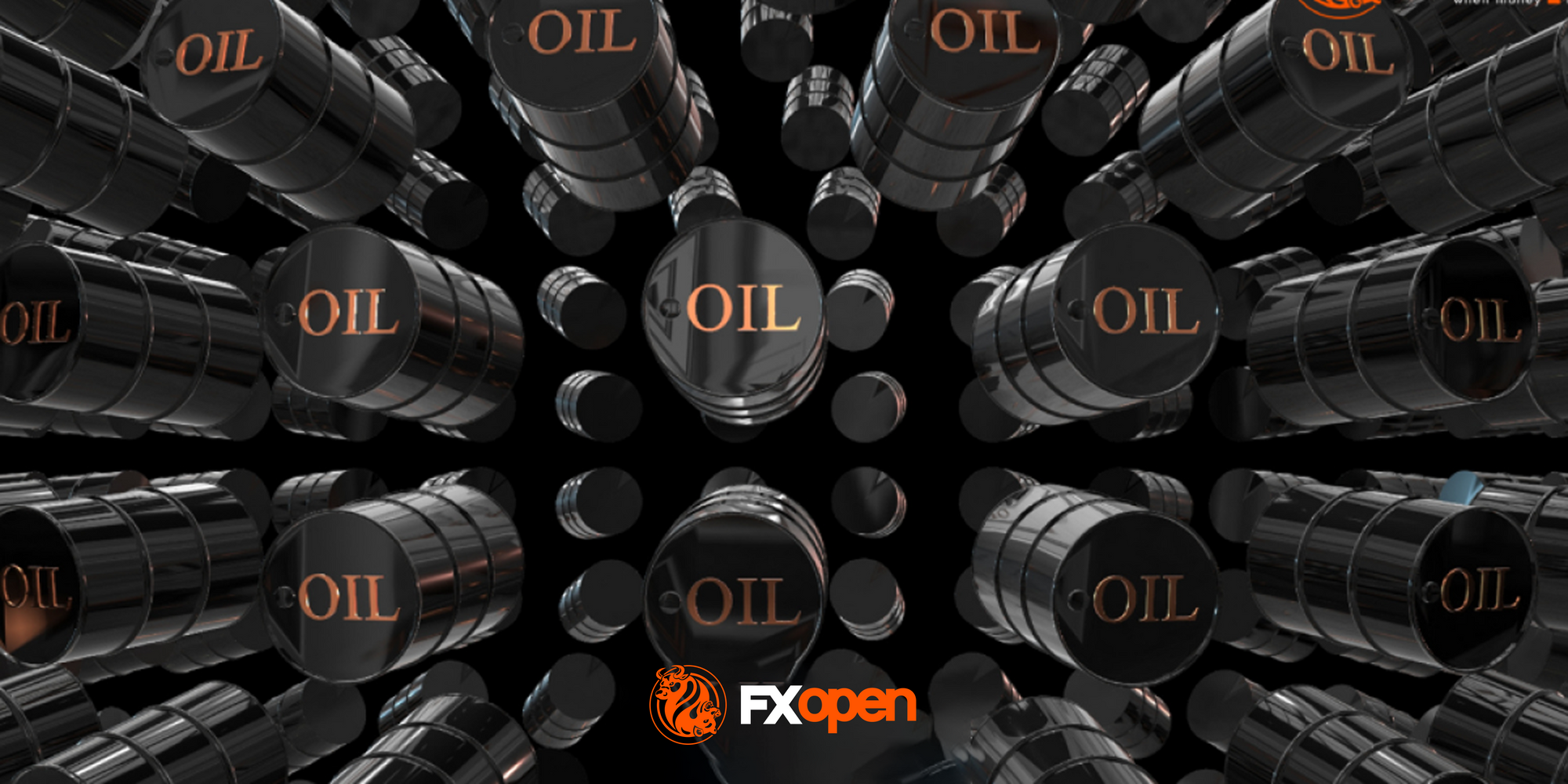FXOpen

Financial markets are the backbone of the global economy, facilitating the allocation of capital and assets. They provide a platform for individuals and organisations to trade and invest in stocks, bonds, currencies, commodities, and more. These markets play a critical role in the smooth functioning of a capitalist economy by allocating resources and creating liquidity for businesses and entrepreneurs.
This FXOpen article is an introduction to financial markets, and it provides an overview of markets by nature of claim, maturity of claim, timing of delivery, and organisational structure. Each plays a critical role in the financial ecosystem, so let’s delve into them.
Financial Markets by Maturity of Claim
The next step in our introduction to global financial markets is financial markets categorised by maturity of claim:
Money Market
Money markets are used for short-term debt securities. They include financial assets such as Treasury bills, commercial paper, and certificates of deposit. These assets offer short-term investment opportunities.
Money markets are characterised by high liquidity, low risk, and low returns. They are crucial for corporations, financial institutions, banks, and governments looking to meet short-term financing needs or invest surplus funds.
Capital Market
Capital markets include long-term debt and equity securities, such as stocks, bonds, and derivatives. There, businesses and governments raise capital for various long-term projects, such as infrastructure development, research, and expansion.
Capital markets are characterised by lower liquidity, higher risk, and higher returns than money markets. Participants include individual investors, institutional investors (such as mutual funds and pension funds), and corporations. These markets fuel innovation and economic growth.
Capital markets are divided into:
Primary
Primary markets are where new securities are issued and offered to the public for the first time. Companies, governments, and other entities use them to raise capital by selling stocks, bonds, and other financial instruments to investors.
The process of issuing securities involves underwriting, and investment banks or other financial institutions purchase the securities from the issuer and then sell them to investors. Examples of primary market transactions are initial public offerings (IPOs), rights offerings, follow-on offerings, and private placements.
Secondary
Secondary markets are the platforms for dealing with existing securities. They provide liquidity to traders and investors by allowing them to buy and sell securities after they have been issued rather than dealing directly with the issuing entity.
Secondary markets can be organised exchanges, such as the New York Stock Exchange (NYSE), the NASDAQ, or the Tokyo Stock Exchange. They can also be in the form of over-the-counter (OTC) markets. Key players include investors, traders, brokers, and market makers.
Secondary markets are essential for price discovery. Prices of the assets fluctuate based on supply and demand, reflecting investor sentiment and fundamental factors affecting the underlying assets.
Financial Markets by Nature of Claim
Financial markets can be categorised by the nature of the financial claims or instruments traded within them. The two primary categories are equity and debt.
Equity
In equity markets, investors buy and sell ownership stakes in companies, represented by shares of common or preferred stock. These markets allow companies to raise capital by issuing shares to the public through initial public offerings (IPOs).
Debt
In debt markets, participants trade debt securities, such as bonds and notes, which represent loans made by investors to governments, corporations, or other entities. Investors in debt markets receive periodic interest payments and the return of the principal amount at maturity.
Financial Markets by Timing of Delivery
The next point in our introduction to financial markets is the timing of delivery.
Cash
In cash markets, also known as spot markets, transactions involve the immediate exchange (usually within two business days) of financial instruments or assets for cash or their equivalent. Cash market participants buy and sell assets like stocks, bonds, commodities, or currencies with ownership and payment transferred immediately. This provides immediate ownership and delivery of assets, making the cash market suitable for investors looking to buy or sell financial instruments for immediate use.
Futures
Futures markets, on the other hand, involve standardised contracts specifying the future delivery of financial instruments or commodities at a predetermined price and date. These contracts are traded on organised exchanges and are not settled immediately but at a future date as specified in the contract. Futures contracts are used for various purposes, including hedging against future price fluctuations and speculative trading. Futures markets allow participants to agree on future transactions, enabling them to manage risk and speculate on price movements over time.
Financial Markets by Organisational Structure
By the organisational structure, financial markets can be divided into:
Exchange-Traded
An exchange-traded market is where various financial instruments, such as stocks, bonds, commodities, and derivatives, are bought and sold through organised exchanges. These financial instruments are traded in a standardised and regulated manner.
Key characteristics of exchange-traded markets include standardisation, centralised exchange platforms, regulatory oversight, high liquidity, continuous trading sessions, and diverse market participants. These markets play a vital role in facilitating transparent and efficient trading of various financial instruments, contributing to price discovery and the allocation of capital within the global financial system.
Over-the-Counter (OTC)
Over-the-counter markets are decentralised platforms where assets, including stocks, bonds, and derivatives, are traded directly between buyers and sellers without the use of an organised exchange. Unlike exchanges, OTC markets don’t have a physical location or trading floor. They may provide access to specific securities or derivatives that may not be available on traditional exchanges.
Key participants include banks, hedge funds, institutional investors, and dealers. OTC trading is conducted through electronic communication networks (ECNs) or through direct negotiations between buyers and sellers, enabling high flexibility.
Financial Markets by Instruments
Financial markets can also be divided into:
Foreign Exchange (Forex)
An introduction to the economics and mathematics of financial markets could be continued by foreign exchange, also known as forex. There, banks, multinational corporations, and individual investors can deal with currencies.
Forex is global and decentralised. It operates 24 hours a day, five days a week. Currency pairs, where the value of one currency is counted in the value of another, are the primary focus of forex. Forex facilitates international trade and investment, allowing entities to hedge currency risk. Meanwhile, traders seek to profit from changes in exchange rates.
Trading forex requires effective technical analysis. The TickTrader platform provides charts of over 600 instruments, including currencies, stocks, indices, and commodities, and numerous technical analysis tools.
Commodities
Commodity markets focus on physical goods, including agricultural products like wheat and coffee, energy resources, oil, and metals like silver and gold. A wide array of goods is divided into hard commodities (natural resources) and soft commodities (agricultural products).
There are numerous participants, including producers, consumers, government and regulatory bodies, and traders. Commodity markets ensure the efficient distribution of physical goods and provide hedging opportunities.
Derivatives
Derivatives are financial contracts whose value is derived from an underlying asset, such as a stock, bond, or commodity. Derivatives serve various purposes, from protecting against price fluctuations to enabling leverage. Types of derivatives include options, futures, swaps, and contracts for difference (CFDs). If you are interested in various CFDs, you can open an FXOpen account and dive into trading over 600 assets.
The main participants include banks, hedge funds, institutional investors, retail traders and investors, and arbitrageurs.
Cryptocurrencies*
These markets involve digital or virtual currencies based on blockchain technology, such as Bitcoin and Ethereum. There are various tokens created for specific purposes, such as utility tokens and stablecoins. Cryptocurrencies* operate independently of traditional financial systems. These markets are open 24 hours a day, seven days a week.
The main participants in cryptocurrency* markets include individual traders, institutional investors, and miners. Cryptocurrencies* attract a broad spectrum of investors, from tech-savvy individuals to conventional financial institutions.
Final Thoughts
In conclusion, financial markets are essential to the functioning of the global economy, providing a platform for individuals and institutions to deal with financial assets. Understanding financial markets is essential for anyone looking to engage in investing, trading, or financial planning. Each type of market serves a unique purpose, and the key is to approach them with knowledge, caution, and a clear strategy.
*At FXOpen UK and FXOpen AU, Cryptocurrency CFDs are only available for trading by those clients categorised as Professional clients under FCA Rules and Professional clients under ASIC Rules, respectively. They are not available for trading by Retail clients.
This article represents the opinion of the Companies operating under the FXOpen brand only. It is not to be construed as an offer, solicitation, or recommendation with respect to products and services provided by the Companies operating under the FXOpen brand, nor is it to be considered financial advice.
Stay ahead of the market!
Subscribe now to our mailing list and receive the latest market news and insights delivered directly to your inbox.








